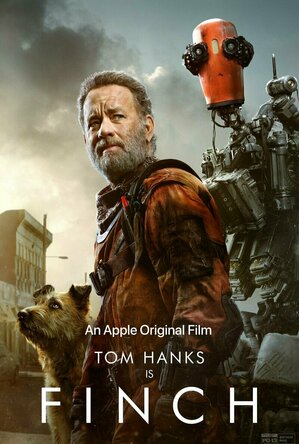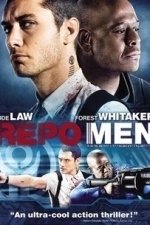Search
Search results
BankofMarquis (1832 KP) rated Finch (2021) in Movies
Nov 18, 2021
Very Effective
There are times when there is a “Perfect Storm” of film material, performance, mood, style and execution of said material and the headspace that I am in when I sit down to view the movie that elevates a film viewing experience above the norm.
Such was my experience when I sat down and watched the Tom Hanks Post-Apocalyptic film FINCH on AppleTV+. On paper, it looks like a run-of-the-mill “last few survivors on Earth struggle to remain alive” film, but - in my experience - it was much better than that.
Starring Tom Hanks as loner scientist Finch, who is scraping by in the remains of St. Louis with a dog and 2 robot helpers - robots of his own creation. When conditions in St. Louis worsen, Finch must pack up (with his 3 companions in tow) and head to a place where he thinks that life might be better - San Francisco.
Pretty standard “road movie” stuff, right? But in the hands of an Actor like Hanks, Emmy Winning GAME OF THRONES Director Miguel Sapochnik, a script by Craig Luck and Ivor Powell that digs into the humanity of Finch (and the situation) and some top-notch Computer animation of the Robots (especially “Jeff” voiced by Caleb Landry Jones), this film elevates itself above the norm.
There are not too many actors who could hold the attention of an audience for 2 hours speaking with 2 robots and a dog, but Hanks manages to do this - and do this very well. He brings his basic decency to the fore and makes us root for him from the start.
The surprise for me was the voice work of Caleb Landry Jones (GET OUT) who matches Hanks beat for beat and brings the same level of decency to his character. It is a testament to Jones’ work in a Motion Capture suit - and the “mo-cap” (Supervised by Scott Stokdyk) that makes the audience see and feel emotions on the face of the robot that just aren’t there. It’s that good.
Director Sapochnik really moves the film at the correct pace as he stops for the humanity, but doesn’t dwell on it too long - and, thus, avoids making the film too sentimental and mawkish. It is a delicate balancing act that this film walks very well.
Probably the biggest movie-going surprise of the year for me. A film that, at this point, will end up in my Top 10 of 2021.
Yes, I am as surprised as you are by this.
Letter Grade: A
9 stars (out of 10) and you can take that to the Bank(ofMarquis)
Such was my experience when I sat down and watched the Tom Hanks Post-Apocalyptic film FINCH on AppleTV+. On paper, it looks like a run-of-the-mill “last few survivors on Earth struggle to remain alive” film, but - in my experience - it was much better than that.
Starring Tom Hanks as loner scientist Finch, who is scraping by in the remains of St. Louis with a dog and 2 robot helpers - robots of his own creation. When conditions in St. Louis worsen, Finch must pack up (with his 3 companions in tow) and head to a place where he thinks that life might be better - San Francisco.
Pretty standard “road movie” stuff, right? But in the hands of an Actor like Hanks, Emmy Winning GAME OF THRONES Director Miguel Sapochnik, a script by Craig Luck and Ivor Powell that digs into the humanity of Finch (and the situation) and some top-notch Computer animation of the Robots (especially “Jeff” voiced by Caleb Landry Jones), this film elevates itself above the norm.
There are not too many actors who could hold the attention of an audience for 2 hours speaking with 2 robots and a dog, but Hanks manages to do this - and do this very well. He brings his basic decency to the fore and makes us root for him from the start.
The surprise for me was the voice work of Caleb Landry Jones (GET OUT) who matches Hanks beat for beat and brings the same level of decency to his character. It is a testament to Jones’ work in a Motion Capture suit - and the “mo-cap” (Supervised by Scott Stokdyk) that makes the audience see and feel emotions on the face of the robot that just aren’t there. It’s that good.
Director Sapochnik really moves the film at the correct pace as he stops for the humanity, but doesn’t dwell on it too long - and, thus, avoids making the film too sentimental and mawkish. It is a delicate balancing act that this film walks very well.
Probably the biggest movie-going surprise of the year for me. A film that, at this point, will end up in my Top 10 of 2021.
Yes, I am as surprised as you are by this.
Letter Grade: A
9 stars (out of 10) and you can take that to the Bank(ofMarquis)
Gareth von Kallenbach (980 KP) rated Repo Men (2010) in Movies
Aug 8, 2019
What does it mean to be both alive and dead?
Based on the novel “The Repossession Mambo” by Eric Garcia, Repo Men is a dark sci-fi action film from director Miguel Sapochnik. It is an oddly sadistic film that begins as a fantastic black comedy/drama, loses its way in the second act with well-shot but mindless action and predictable plot elements, yet still finds its way back before the credits roll.
Remy and Jake, played by Jude Law and Forest Whitaker, are both Repo Men for The Union, an alarming combination of loan shark and artificial organ manufacturer. Those unfortunate patients that fall too far behind on their payments have their artificial parts removed and reclaimed, often accompanied by grisly special effects. Through an accident at a routine repossession, Remy ends up needing a new heart. In the process of trying to pay for it, he realizes that he can no longer find the moral ambivalence necessary to take the life of a stranger in order to earn the money to save his own. This film is definitely not for the squeamish, and many scenes were not unlike watching a surgery in progress.
This film will certainly attract more than a nod from those clamoring for universal healthcare in the United States, as well as those railing against corporate greed at the expense of human life. The Union is everything we love to hate in a corporation. Nothing, from duping emotionally compromised patients, to putting profits above all else, to even killing people, is out of bounds for this corporation. It’s uncommon to see corporate evil of this magnitude in a film, and with Liev Schreiber manning the helm, this evil is personified and delivered with such panache that he becomes an enjoyable caricature to watch.
This movie would be nothing without Remy’s path from classic amoral psychopath to redeemed soul, but the journey at times becomes muddy and obscure. Law plays the part somewhat stiffly, but still manages to shine in his interactions with Whitaker and Schreiber. Whitaker, however, is fantastic as Remy’s uncompromisingly unsympathetic partner Jake, who holds on tightly to what he knows and believes, however unprincipled. By the film’s end, Whitaker’s performance as the frustrated partner becomes even more impressive when compared to Law’s movement from perpetrator to victim to agent of retribution.
For years, Remy had no moral compunction against repossessing organs, nearly always from those who will die without them. But when his heart is removed, he suddenly empathizes with the victims of his profession. An odd paradox: that becoming less human can impart more humanity. Remy is both more genuinely alive after receiving his artificial heart, and more certain he will be dead when he can no longer pay. This is the crux of the film, and on this basis a clever story is told about the intersection of making a living, being alive, and the entanglements they create.
Based on the novel “The Repossession Mambo” by Eric Garcia, Repo Men is a dark sci-fi action film from director Miguel Sapochnik. It is an oddly sadistic film that begins as a fantastic black comedy/drama, loses its way in the second act with well-shot but mindless action and predictable plot elements, yet still finds its way back before the credits roll.
Remy and Jake, played by Jude Law and Forest Whitaker, are both Repo Men for The Union, an alarming combination of loan shark and artificial organ manufacturer. Those unfortunate patients that fall too far behind on their payments have their artificial parts removed and reclaimed, often accompanied by grisly special effects. Through an accident at a routine repossession, Remy ends up needing a new heart. In the process of trying to pay for it, he realizes that he can no longer find the moral ambivalence necessary to take the life of a stranger in order to earn the money to save his own. This film is definitely not for the squeamish, and many scenes were not unlike watching a surgery in progress.
This film will certainly attract more than a nod from those clamoring for universal healthcare in the United States, as well as those railing against corporate greed at the expense of human life. The Union is everything we love to hate in a corporation. Nothing, from duping emotionally compromised patients, to putting profits above all else, to even killing people, is out of bounds for this corporation. It’s uncommon to see corporate evil of this magnitude in a film, and with Liev Schreiber manning the helm, this evil is personified and delivered with such panache that he becomes an enjoyable caricature to watch.
This movie would be nothing without Remy’s path from classic amoral psychopath to redeemed soul, but the journey at times becomes muddy and obscure. Law plays the part somewhat stiffly, but still manages to shine in his interactions with Whitaker and Schreiber. Whitaker, however, is fantastic as Remy’s uncompromisingly unsympathetic partner Jake, who holds on tightly to what he knows and believes, however unprincipled. By the film’s end, Whitaker’s performance as the frustrated partner becomes even more impressive when compared to Law’s movement from perpetrator to victim to agent of retribution.
For years, Remy had no moral compunction against repossessing organs, nearly always from those who will die without them. But when his heart is removed, he suddenly empathizes with the victims of his profession. An odd paradox: that becoming less human can impart more humanity. Remy is both more genuinely alive after receiving his artificial heart, and more certain he will be dead when he can no longer pay. This is the crux of the film, and on this basis a clever story is told about the intersection of making a living, being alive, and the entanglements they create.

